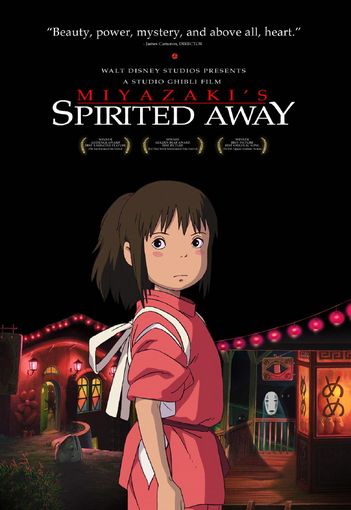A Look into Miyazaki's Spirited Away
In his fifty-plus years of animating, directing, producing, and writing, Hayao Miyazaki has gained much international acclaim for his work in animated films—so much that he is considered a household name in all of Japan, kind of like a Japanese version of America’s Steven Spielberg, and for good reason. Indeed, Miyazaki’s films do more than just entertain the audience; they enthrall, teach, and inspire. Of course, it would take years (and lots and lots of AlteSententiam issues) to fully introduce to you every single one of his works, so I have decided to narrow down his works into three of what I consider to be his best works. The first film we’ll take a look at is Spirited Away.
A Look into Miyazaki’s Spirited Away
 Magical, enchanting, captivating, and spellbinding—Hayao Miyazaki’s Spirited Away is all of these and more. An Alice in Wonderland-esque tale about fantasy and childhood, Spirited Away tells the story of a lost girl’s adventures in a world of spirits.
Magical, enchanting, captivating, and spellbinding—Hayao Miyazaki’s Spirited Away is all of these and more. An Alice in Wonderland-esque tale about fantasy and childhood, Spirited Away tells the story of a lost girl’s adventures in a world of spirits.
The film opens with ten-year old Chihiro, as she and her family are moving to their new home. On the car ride to there, her father takes a shortcut through a strange and secluded forest but instead, ends up getting lost near an old tunnel. Despite Chihiro’s misgivings about the place, her parents decide to park the car and take a look around. As they pass through the tunnel, they emerge to what appears to be a deserted theme park. After her parents discover an empty restaurant and start sampling the food there, Chihiro wanders off and returns later, only to discover that her parents have been turn into pigs!
Not knowing what to do, but determined to somehow help her parents, she befriends Haku, a mysterious boy with an equally mysterious past. From him, Chihiro learns that her family has become trapped in the spirit world and that she must find a job or risk turning into a pig herself. With Haku’s help, Chihiro manages to find work at the bathhouse—a resort run by a mean-spirited witch named Yubaba—as she continues her quest to save her parents.
In the barest sense, Spirited Away is simply a coming-of-age tale young girl’s heroic journey into the fantastic world. The trials and tribulations she ends up facing mark the typical trials and rites-of-passage of growing up, and becoming an adult. However Spirited Away is so much more than that. It’s a film about discovering one’s own identity, about the transition between childhood and adulthood. It’s about the dual-sidedness of human nature, about the effects of excess and greed, and about the strength of the human spirit in the face of adversity. It’s about feminism and environmental pollution and traditional versus modern society. But most importantly, it’s about the power of love and the goodness of mankind.
I cannot possibly even begin to express my love for this film in words, especially concerning the animation and soundtrack. If you’ve ever seen any of Miyazaki’s works, you’ll understand what I mean. Miyazaki has a way of expressing so many things in one given scene—unlike any other animator I’ve ever seen. The same applies for the music in Spirited Away. Directed and composed by Joe Hisaishi, the soundtrack for this film is absolutely incredible and is as breathtaking as the film itself.
In addition to that, Spirited Away is great on so many other levels. It’ll make you laugh, smile, maybe even shed a tear or two, but believe me when I say that it will be well worth two hours of your time. So what are you waiting for? Go see it!




